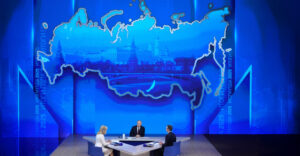The Russian operation allegedly aimed to manipulate politicians, businesspeople, journalists, and other influencers in Germany, France, Italy, and the UK, as shown in a file submitted by the FBI to a U.S. court.
The Kremlin’s campaign in Europe sought to sow division, discredit America, and undermine support for Ukraine, according to Russian documents, notes, and minutes from psychological warfare meetings.
On Wednesday, the U.S. government charged two Russian citizens, officials of the Russian state network RT, with trying to influence the U.S. elections. They were charged with money laundering and planning to hire a U.S. company to produce online content. The FBI also seized more than 30 internet domains linked to a campaign influencing U.S. elections.
The documents obtained by the FBI were submitted to the court as part of the charges. The 277-page file details Russian plans to influence Europe.
“Logical and emotional reactions”
A memo from Russia’s Social Design Agency describes a plan to target people through authentic posts and comments on social media to bypass bot filters on platforms.
The Social Design Agency operates under the orders of Sergei Kiriyenko, deputy chief of staff to Russian President Vladimir Putin, according to the FBI’s court testimony.
The Russian document states that the goal of the campaign is to evoke “logical (such as, ‘Really, why should WE help Ukraine?’) and emotional (such as, ‘The Americans are such bastards!’) reactions.”
The psychological operations also used so-called “doppelgänger” domains to spread fake articles and content that appeared to come from Western media outlets. These domains included imitations of Reuters, Der Spiegel, Bild, Le Monde, Le Parisien, Welt, FAZ, Süddeutsche Zeitung, Delfi, and others, and were funded through cryptocurrencies such as bitcoin, according to the FBI testimony.
Germany most vulnerable to manipulation
Russia’s psychological operations team identified Germany as a particularly vulnerable target for Russian influence.
“Germans are more dependent than the French,” reads one of the Russian documents, apparently referring to Germany’s economic dependence on natural gas and exports.
“First, we need to discredit the U.S., Great Britain, and NATO, and second, convince the Germans to oppose the ‘ineffective sanctions policy,’” the FBI notes in an internal Russian memo.
“Stoking international conflicts”
Another document from the Social Design Agency describes an operation called “Stoking international conflicts” targeting France and Germany specifically.
The goal of the operation is to “escalate internal tensions… to promote the interests of the Russian Federation,” as well as “influence real-life conflicts and artificially create conflict situations” through fake articles, influencers, and targeted social media posts and comments.
The Russian document adds that the aim was to “destabilise the social situation” in France and Germany through the “spread of additional false narratives,” “fake videos, documents, and telephone recordings,” “social media comments,” and “fake and real statements from influencers.”
Ask me anything
Explore related questions





